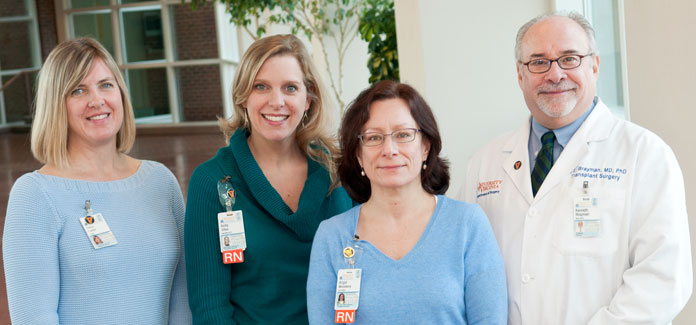
UVA Health System has the only comprehensive organ transplant program in Virginia, offering the full spectrum of advanced treatment options for patients with organ failure. “All available services are offered here, which speaks to the level of expertise within our program,” says Kenneth Brayman, MD, Transplant Surgery Division Chief. “We transplant all organs – kidney, lung, liver, heart, pancreas, bone marrow – and provide expert management of organ dysfunction, which can delay or prevent the need for transplant altogether.”
Achieving Excellent Outcomes
In a recent scorecard by the Scientific Registry of Transplant Recipients, which provides national benchmarks for transplant procedures, UVA received excellent ratings overall, with its adult liver transplant program ranking within the top one percent nationally and the adult lung transplant program posting the 2nd highest one-year patient survival.
“UVA is one of just two adult transplant centers in the country to have statistically higher one-year survival rates for liver transplantation combined with statistically lower waitlist mortality,” says Patrick Northup, MD, Liver Transplant Medical Director. “Our numbers are excellent compared to all other regional providers and they are proof of the dedication and skill of our transplant team. They work hard and know what it takes to care for critically ill patients.”
Overcoming the Organ Shortage
Since performing its first kidney transplant in the 1960s, UVA has continued to grow its transplant capabilities and advance the field overall through ongoing research. As a result, services have matured and inclusion criteria for organ recipients have broadened. The number of donors, however, has remained stagnant. “The organ shortage is here,” says Brayman.
To help bridge the gap, UVA has introduced novel approaches to secure organs for those in need. For example, UVA is now participating in the Paired Kidney Exchange Program, which expands the number of potential donor/recipient combinations by broadening the pool beyond relatives or deceased donors to include others on the national registry. For its first paired donor exchange last winter, UVA was part of a chain of giving and receiving among five best-matched pairs at hospitals in five states.
Approximately 30 to 40 percent of kidney transplants performed at UVA today are now living donations, according to Brayman. Even in cases in which donor and recipient are blood-type incompatible or recipients are a “positive cross match,” transplantation is now possible. UVA has also reinstituted its living donor program for liver transplant with great success. The advantages of living donations include shorter wait times and better quality organs.
Talk to Your Patients
As you may know, April is National Donate Life Month. It’s a great time to talk to your patients about the value of organ donation. At UVA, potential donors have the support of a Donor Advocacy Team, which includes physicians, as well as a social worker and psychologists who ensure they are not only physically but physiologically prepared for the procedure and understand the risks associated with it. After a phone screening, potential donors undergo lab tests and ultrasound imaging to determine whether they are viable candidates. Those who have preexisting kidney disease, high blood pressure or diabetes will be excluded.
For more talking points on becoming an organ donor, go to donatelifevirginia.org.
Learn more about the UVA Transplant Program.
Read a recent case study on lung transplant.